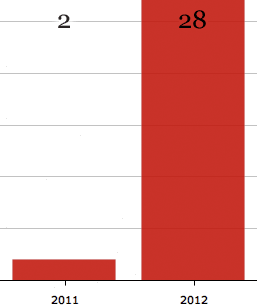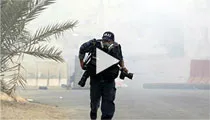Press freedom languished despite the establishment of a new government under President Abdo Rabbo Mansour Hadi. Anti-government demonstrations continued as protesters demanded deeper reforms than those offered by Hadi’s administration. Critical independent journalists were assaulted, threatened, and harassed from multiple sides. In February, armed men belonging to an influential tribal group attacked a journalist who had reported critically about the clan. The same month, supporters of former President Ali Abdullah al-Saleh seized the offices of two state-run newspapers and forced them to publish Saleh’s picture on the front page. In May, the Press and Publications Court summoned two Al-Jazeera journalists for trial on charges that they had reported on the 2011 uprising without accreditation. The trial was pending in late year. The government debated an Audio-Visual and Electronic Media bill that was first proposed by the Saleh administration in 2010. CPJ’s review of the legislation found it would impose exorbitant registration and licensing fees, among other restrictions. The bill was pending in late year. No journalists were killed during the year, a drop from 2011 when two fatalities occurred during coverage of anti-government protests.
Yemen
» Journalists face attacks from government, tribal group, Saleh loyalists.
» Government revives repressive media bill; renews trial against Al-Jazeera.
Press freedom languished despite the establishment of a new government under President Abdo Rabbo Mansour Hadi. Anti-government demonstrations continued as protesters demanded deeper reforms than those offered by Hadi’s administration. Critical independent journalists were assaulted, threatened, and harassed from multiple sides. In February, armed men belonging to an influential tribal group attacked a journalist who had reported critically about the clan. The same month, supporters of former President Ali Abdullah al-Saleh seized the offices of two state-run newspapers and forced them to publish Saleh’s picture on the front page. In May, the Press and Publications Court summoned two Al-Jazeera journalists for trial on charges that they had reported on the 2011 uprising without accreditation. The trial was pending in late year. The government debated an Audio-Visual and Electronic Media bill that was first proposed by the Saleh administration in 2010. CPJ’s review of the legislation found it would impose exorbitant registration and licensing fees, among other restrictions. The bill was pending in late year. No journalists were killed during the year, a drop from 2011 when two fatalities occurred during coverage of anti-government protests.
Attacks on the press peaked between February and May, when CPJ documented 13 attacks, including a month-long siege of a state-run newspaper that was led by armed Saleh loyalists.
| 7 | Government agents/supporters |
| 4 | Saleh loyalists |
| 2 | Armed factions of Al-Ahmar tribe |
CPJ documented no work-related fatalities in Yemen, in contrast with 2011, when two journalists were killed during the months-long uprising. Regionwide, fatalities soared in Syria but dropped in most other nations.
Bahrain |  |
Egypt |  |
Iran |  |
Iraq |  |
Israel and the Occupied Palestinian Territory |  |
Libya |  |
Syria |  |
Tunisia |  |
Yemen |  |
Yemeni authorities were holding one journalist in prison when CPJ conducted its annual worldwide census on December 1. By the end of 2012, Abdulelah Hider Shaea had spent 869 days in prison on anti-state charges stemming from his coverage of extremist groups in Yemen.
August 16, 2010: | Soldiers raid Shaea's home in Sana'a, arresting him for the second time in two months. |
September 16, 2010: | Shaea's first hearing takes place after he has been held incommunicado for 29 days. |
September 23, 2010: | CPJ writes a letter to then-President Saleh calling for Shaea's immediate release. |
January 19, 2011: | The Specialized Criminal Court in Sana'a, whose constitutionality has been questioned by analysts, sentences Shaea to five years in prison on charges of "belonging to an illegal armed organization" and "recruiting young people, including foreigners, to the organization by communicating with them via the Internet." |
February 2011: | Saleh pardons Shaea. The decision is quickly reversed after U.S. President Barack Obama calls Saleh to express concern about the pardon. |
2012: | Local press freedom groups including CPJ continue to call for Shaea's release throughout the year. |
The authorities debated the Audio-Visual and Electronic Media bill, which would impose licensing fees of up to US$167,000 on news outlets, according to news reports. The bill was pending in late year.

